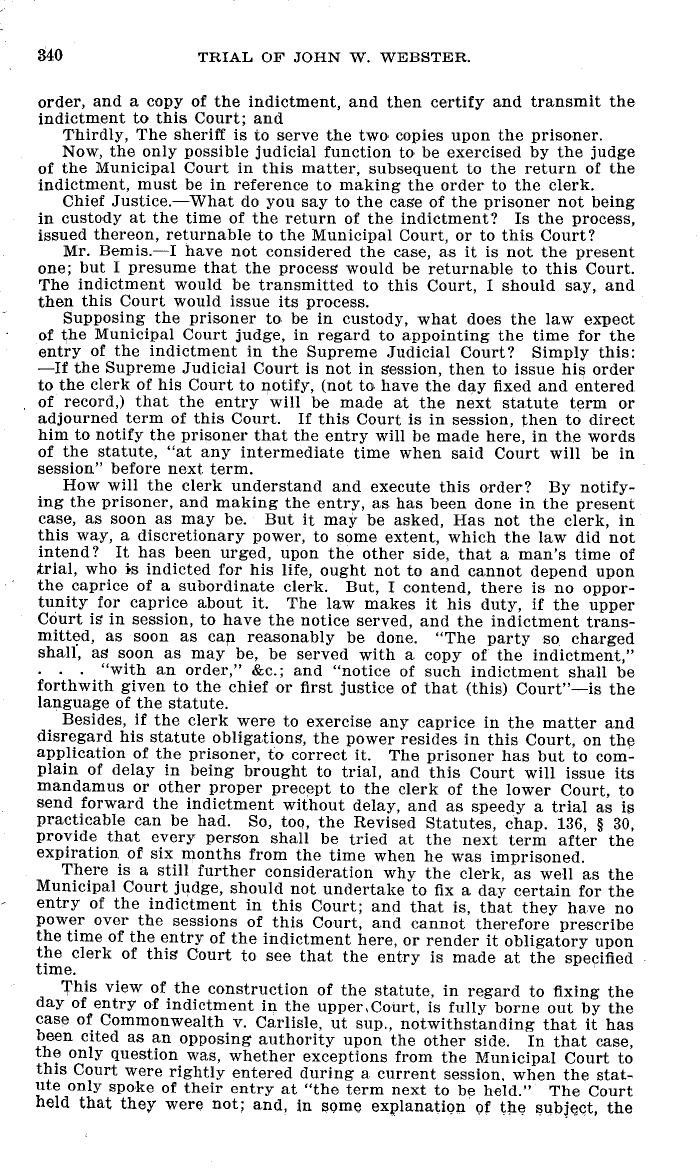|
340 TRIAL OF JOHN W. WEBSTER.
order, and a copy of the indictment, and then certify and transmit the
indictment to this Court; and
Thirdly, The sheriff is to serve the two copies upon the prisoner.
Now, the only possible judicial function to be exercised by the judge
of the Municipal Court in this matter, subsequent to the return of the
indictment, must be in reference to making the order to the clerk.
Chief Justice.-What do you say to the cage of the prisoner not being
in custody at the time of the return of the indictment? Is the process,
issued thereon, returnable to the Municipal Court, or to this. Court?
Mr. Bemis.-I have not considered the case, as it is not the present
one; but I presume that the process would be returnable to this Court.
The indictment would be transmitted to this Court, I should say, and
then this Court would issue its process.
Supposing the prisoner to be in custody, what does the law expect
of the Municipal Court judge, in regard to appointing the time for the
entry of the indictment in the Supreme Judicial Court? Simply this:
-If the Supreme Judicial Court is not in session, then to issue his order
to the clerk of his Court to notify, (not to, have the day fixed and entered
of record,) that the entry will be made at the next statute term or
adjourned term of this Court. If this Court is in session, then to direct
him to notify the prisoner that the entry will be made here, in the words
of the statute, "at any intermediate time when said Court will be in
session" before next. term.
How will the clerk understand and execute this order? By notify-
ing the prisoner, and making the entry, as has been done in the present
case, as soon as may be. But it may be asked, Has not the clerk, in
this way, a discretionary power, to some extent, which the law did not
intend? It has been urged, upon the other side, that a man's time of
trial, who is indicted for his life, ought not to and cannot depend upon
the caprice of a subordinate clerk. But, I contend, there is no oppor-
tunity for caprice about it. The law makes it his duty, if the upper
Court is in session, to have the notice served, and the indictment trans-
mitted, as soon as cap reasonably be done. "The party so charged
shall, as soon as may be, be served with a, copy of the indictment,"
"with an order," &c.; and "notice of such indictment shall be
forthwith given to the chief or first justice of that (this) Court"-is the
language of the statute.
Besides, if the clerk were to exercise any caprice in the matter and
disregard his statute obligations, the power resides in this Court, on the
application of the prisoner, to correct it. The prisoner has but to com-
plain of delay in being brought to trial, and this Court will issue its
mandamus or other proper precept to the clerk of the lower Court, to
send forward the indictment without delay, and as speedy a trial as is
practicable can be had. So, too, the Revised Statutes, chap. 136, § 30,
provide that every person shall be tried at the next term after the
expiration of six months from the time when he was imprisoned.
There is a still further consideration why the clerk, as well as the
Municipal Court judge, should not undertake to fix a day certain for the
entry of the indictment in this Court; and that is, that they have no
power over the sessions of this Court, and cannot therefore prescribe
the time of the entry of the indictment here, or render it obligatory upon
the clerk of this Court to see that the entry is made at the specified
time.
This view of the construction of the statute, in regard to fixing the
day of entry of indictment in the upper,Court, is fully borne out by the
case of Commonwealth v. Carlisle, ut sup., notwithstanding that it has
been cited as an opposing authority upon the other side. In that case,
the only question was, whether exceptions from the Municipal Court to
this Court were rightly entered during a current session, when the stat-
ute only spoke of their entry at "the term next to be held." The Court
held that they were not; and, in some explanation of the subject, the
|

